谈一谈 build-scripts 架构设计
一、写在前面
在 ICE、Rax 等项目研发中,我们或多或少都会接触到 build-scripts 的使用。build-scripts 是集团共建的统一构建脚手架解决方案,其除了提供基础的 start、build 和 test 命令外,还支持灵活的插件机制供开发者扩展构建配置。
本文尝试通过场景演进的方式,来由简至繁地讲解一下 build-scripts 的架构演进过程,注意下文描述的演进过程意在讲清 build-scripts 的设计原理及相关方法的作用,并不代表 build-scripts 实际设计时的演进过程,如果文中存在理解错误的地方,还望指正。
二、架构演进
0. 构建场景
我们先来构建这样一个业务场景:
假设我们团队内有一个前端项目 project-a,项目使用 webpack 来进行构建打包。
项目 project-a
project-a
|- /dist
|- main.js
|- /src
|- say.js
|- index.js
|- /scripts
|- build.js
|- package.json
|- package-lock.jsonproject-a/src/say.js
const sayFun = () => {
console.log('hello world!');
};
module.exports = sayFun;project-a/src/index.js
const say = require('./say');
say();project-a/scripts/build.js
const path = require('path');
const webpack = require('webpack');
// 定义 webpack 配置
const config = {
entry: './src/index',
output: {
filename: 'main.js',
path: path.resolve(__dirname, '../dist'),
},
};
// 实例化 webpack
const compiler = webpack(config);
// 执行 webpack 编译
compiler.run((err, stats) => {
compiler.close((closeErr) => {});
});project-a/package.json
{
"name": "project-a",
"version": "1.0.0",
"description": "",
"main": "dist/main.js",
"scripts": {
"build": "node scripts/build.js",
"test": "echo \"Error: no test specified\" && exit 1"
},
"keywords": [],
"author": "",
"license": "ISC",
"devDependencies": {
"webpack": "^5.74.0"
}
}过段时间由于业务需求,我们新建了一个前端项目 project-b。由于项目类型相同, 项目 project-b 想要复用项目 project-a 的 webpack 构建配置, 此时应该怎么办呢?

1. 拷贝配置
为了项目快速上线,我们可以先直接从项目 project-a 拷贝一份 webpack 构建配置到项目 project-b ,再配置一下 package.json 中的 build 命令,项目 project-b 即可“完美复用”。

项目 project-b
project-b
|- /dist
+ |- main.js
|- /src
|- say.js
|- index.js
+ |- /scripts
+ |- build.js
|- package.json
|- package-lock.jsonproject-b/package.json
{
"name": "project-b",
"version": "1.0.0",
"description": "",
"main": "dist/main.js",
"scripts": {
+ "build": "node scripts/build.js",
"test": "echo \"Error: no test specified\" && exit 1"
},
"keywords": [],
"author": "",
"license": "ISC",
+ "devDependencies": {
+ "webpack": "^5.74.0"
+ }
}2. 封装 npm 包
下面我们的场景先来演进一下:
项目 project-b 上线一段时间后,团队内推行项目 TS 化,我们首先对项目 project-a 进行了如下改造:
项目 project-a
project-a
|- /dist
|- main.js
|- /src
- |- say.js
- |- index.js
+ |- say.ts
+ |- index.ts
|- /scripts
|- build.js
+ |- tsconfig.json
|- package.json
|- package-lock.jsonproject-a/scripts/build.js
const path = require('path');
const webpack = require('webpack');
// 定义 webpack 配置
const config = {
entry: './src/index',
+ module: {
+ rules: [
+ {
+ test: /\.ts?$/,
+ use: 'ts-loader',
+ exclude: /node_modules/,
+ },
+ ],
+ },
+ resolve: {
+ extensions: ['.ts', '.js'],
+ },
...
};
...
// 执行 webpack 编译
compiler.run((err, stats) => {
compiler.close((closeErr) => {});
});
project-a/package.json
{
"name": "project-a",
...
"devDependencies": {
+ "ts-loader": "^9.3.1",
+ "typescript": "^4.8.2",
+ "@types/node": "^18.7.14",
"webpack": "^5.74.0"
}
}由于项目 project-b 也需要完成 TS 化,所以我们不得不按照项目 project-a 的修改,在项目 project-b 里也重复修改一次。此时通过拷贝在项目间复用配置的问题就暴露出来了:构建配置更新时,项目间需要同步手动修改,配置维护成本较高,且存在修改不一致的风险。
一般来说,拷贝只能临时解决问题,并不是一个长期的解决方案。如果构建配置需要在多个项目间复用,我们可以考虑将其封装为一个 npm 包来独立维护。下面我们新建一个 npm 包 build-scripts 来做这件事:
npm 包 build-scripts
build-scripts
|- /bin
|- build-scripts.js
|- /lib (ts 构建目录,文件同 src)
|- /src
|- /commands
|- build.ts
|- tsconfig.json
|- package.json
|- package-lock.jsonbuild-scripts/bin/build-scripts.js
#!/usr/bin/env node
const program = require('commander');
const build = require('../lib/commands/build');
(async () => {
// build 命令注册
program.command('build').description('build project').action(build);
// 判断是否有存在运行的命令,如果有则退出已执行命令
const proc = program.runningCommand;
if (proc) {
proc.on('close', process.exit.bind(process));
proc.on('error', () => {
process.exit(1);
});
}
// 命令行参数解析
program.parse(process.argv);
// 如果无子命令,展示 help 信息
const subCmd = program.args[0];
if (!subCmd) {
program.help();
}
})();
build-scripts/src/commands/build.ts
import * as path from 'path';
import * as webpack from 'webpack';
export = async () => {
const rootDir = process.cwd();
// 定义 webpack 配置
const config = {
entry: path.resolve(rootDir, './src/index'),
module: {
rules: [
{
test: /\.ts?$/,
use: require.resolve('ts-loader'),
exclude: /node_modules/,
},
],
},
resolve: {
extensions: ['.ts', '.js'],
},
output: {
filename: 'main.js',
path: path.resolve(rootDir, './dist'),
},
};
// 实例化 webpack
const compiler = webpack(config);
// 执行 webpack 编译
compiler.run((err, stats) => {
compiler.close((closeErr) => {});
});
};
build-scripts/package.json
{
"name": "build-scripts",
"version": "1.0.0",
"description": "",
"bin": {
"build-scripts": "bin/build-scripts.js"
},
"scripts": {
"build": "tsc",
"start": "tsc -w",
"test": "echo \"Error: no test specified\" && exit 1"
},
"keywords": [],
"author": "",
"license": "ISC",
"dependencies": {
"commander": "^9.4.0",
"ts-loader": "^9.3.1",
"webpack": "^5.74.0"
},
"devDependencies": {
"@types/webpack": "^5.28.0",
"typescript": "^4.8.2"
}
}
我们将项目的构建配置抽离到 npm 包 build-scripts 里进行统一维护,同时以脚手架的方式来提供项目调用,降低项目的接入成本。项目 project-a 和项目 project-b 只需做如下改造:
项目 project-a
project-a
|- /dist
|- main.js
|- /src
|- say.ts
|- index.ts
- |- /scripts
- |- build.js
|- tsconfig.json
|- package.json
|- package-lock.jsonproject-a/package.json
{
"name": "project-a",
...
"scripts": {
- "build": "node scripts/build.js",
+ "build": "build-scripts build",
"test": "echo \"Error: no test specified\" && exit 1"
},
...
"devDependencies": {
- "ts-loader": "^9.3.1",
+ "build-scripts": "^1.0.0",
"typescript": "^4.8.2",
"@types/node": "^18.7.14",
- "webpack": "^5.74.0"
}
}项目 project-b 改造同项目 project-a
改造完成后,项目 project-a 和项目 project-b 不再需要在项目里独立维护构建配置,而是通过统一脚手架的方式调用 build-scripts 的 build 命令进行构建打包。后续构建配置更新时,各个项目也只需要升级 npm 包 build-scripts 版本即可,避免了之前手动拷贝带来的修改维护问题。
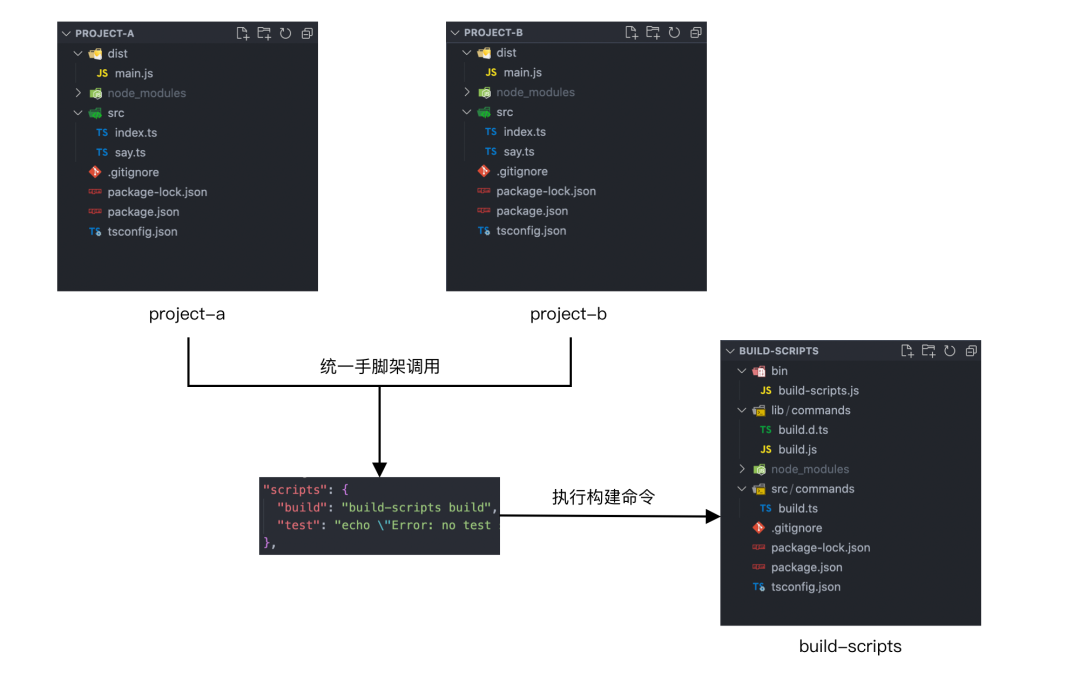
3. 添加用户配置
下面我们的场景再来演进一下:
由于业务需求,我们又新建了一个前端项目 project-c。项目 project-c 想要接入 build-scripts 进行构建打包,但它的打包入口并不是默认的 src/index,构建目录也不是 /dist,此时应该怎么办呢?
一般来说,不同项目对构建配置都会有一定的自定义需求,所以我们需要将一些常用的配置开放给项目进行设置,例如 entry、outputDir 等。基于这个目的,我们下面来对 build-scripts 进行一下改造:
我们首先来为项目 project-c 新增一个用户配置文件 build.json。
项目 project-c
project-c
|- /build
|- main.js
|- /src
|- say.ts
|- index1.ts
+ |- build.json
|- tsconfig.json
|- package.json
|- package-lock.jsonproject-c/build.json
{
"entry": "./src/index1",
"outputDir": "./build"
}然后我们来对 build-scritps 里的执行逻辑进行一下改造,让 build-scripts 在执行构建命令时,先读取当前项目下的用户配置 build.json,然后使用用户配置来覆盖默认的构建配置。
build-scripts/src/commands/build.ts
import * as path from 'path';
import * as webpack from 'webpack';
export = async () => {
const rootDir = process.cwd();
+ // 获取用户配置
+ let userConfig: { [name: string]: any } = {};
+ try {
+ userConfig = require(path.resolve(rootDir, './build.json'));
+ } catch (error) {
+ console.log('Config error: build.json is not exist.');
+ return;
+ }
+ // 用户配置非空及合法性校验
+ if (!userConfig.entry) {
+ console.log('Config error: userConfig.entry is not exist.');
+ return;
+ }
+ if (typeof userConfig.entry !== 'string') {
+ console.log('Config error: userConfig.entry is not valid.');
+ return;
+ }
+ if (!userConfig.outputDir) {
+ console.log('Config error: userConfig.outputDir is not exist.');
+ return;
+ }
+ if (typeof userConfig.outputDir !== 'string') {
+ console.log('Config error: userConfig.outputDir is not valid.');
+ return;
+ }
// 定义 webpack 配置
const config = {
- entry: path.resolve(rootDir, './src/index'),
+ entry: path.resolve(rootDir, userConfig.entry),
...
output: {
filename: 'main.js',
- path: path.resolve(rootDir, './dist'),
+ path: path.resolve(rootDir, userConfig.outputDir),
},
};
...
};通过上面的改造,我们就可以基本实现项目 project-c 对于构建配置的自定义需求。
但仔细观察后,我们可以发现上面的改造方式存在一些问题:
- 单个配置的判空、合法性校验及默认配置覆盖逻辑在代码中是分散的,后期配置增加不易管理。
- 单个配置的覆盖逻辑是和默认配置耦合在一起的,且单个配置判空失败后没有默认值兜底,不利于默认配置的独立维护。
基于以上问题,我们再来对 build-scripts 进行一下改造:
npm 包 build-scripts
build-scripts
|- /bin
|- build-scripts.js
|- /lib (ts 构建目录,文件同 src)
|- /src
|- /commands
|- build.ts
+ |- /configs
+ |- build.ts
+ |- /core
+ |- ConfigManager.ts
|- tsconfig.json
|- package.json
|- package-lock.json我们首先将默认的构建配置抽离到一个独立的文件 configs/build.ts进行维护。
build-scripts/src/configs/build.ts
const path = require('path');
const rootDir = process.cwd();
const buildConfig = {
entry: path.resolve(rootDir, './src/index'),
module: {
rules: [
{
test: /\.ts?$/,
use: require.resolve('ts-loader'),
exclude: /node_modules/,
},
],
},
resolve: {
extensions: ['.ts', '.js'],
},
output: {
filename: 'main.js',
path: path.resolve(rootDir, './dist'),
},
};
export default buildConfig;然后我们新增一个 ConfigManager 类来进行构建配置的管理,负责用户配置和默认构建配置的合并。
build-scripts/src/core/ConfigManager.ts
import _ = require('lodash');
import path = require('path');
import assert = require('assert');
// 配置类型定义
interface IConfig {
[key: string]: any;
}
// 用户配置注册信息类型定义
interface IUserConfigRegistration {
[key: string]: IUserConfigArgs;
}
interface IUserConfigArgs {
name: string;
defaultValue?: any;
validation?: (value: any) => Promise<boolean>;
configWebpack?: (defaultConfig: IConfig, value: any) => void;
}
class ConfigManager {
// webpack 配置
public config: IConfig;
// 用户配置
public userConfig: IConfig;
// 用户配置注册信息
private userConfigRegistration: IUserConfigRegistration;
constructor(config: IConfig) {
this.config = config;
this.userConfig = {};
this.userConfigRegistration = {};
}
/**
* 注册用户配置
*
* @param {IUserConfigArgs[]} configs
* @memberof ConfigManager
*/
public registerUserConfig = (configs: IUserConfigArgs[]) => {
configs.forEach((conf) => {
const configName = conf.name;
// 判断配置属性是否已注册
if (this.userConfigRegistration[configName]) {
throw new Error(
`[Config File]: ${configName} already registered in userConfigRegistration.`
);
}
// 添加配置的注册信息
this.userConfigRegistration[configName] = conf;
// 如果当前项目的用户配置中不存在该配置值,则使用该配置注册时的默认值
if (
_.isUndefined(this.userConfig[configName]) &&
Object.prototype.hasOwnProperty.call(conf, 'defaultValue')
) {
this.userConfig[configName] = conf.defaultValue;
}
});
}
/**
* 获取用户配置
*
* @private
* @return {*}
* @memberof ConfigManager
*/
private getUserConfig = () => {
const rootDir = process.cwd();
try {
this.userConfig = require(path.resolve(rootDir, './build.json'));
} catch (error) {
console.log('Config error: build.json is not exist.');
return;
}
}
/**
* 执行注册用户配置
*
* @param {*} configs
* @memberof ConfigManager
*/
private runUserConfig = async () => {
for (const configInfoKey in this.userConfig) {
const configInfo = this.userConfigRegistration[configInfoKey];
// 配置属性未注册
if (!configInfo) {
throw new Error(
`[Config File]: Config key '${configInfoKey}' is not supported.`
);
}
const { name, validation } = configInfo;
const configValue = this.userConfig[name];
// 配置值校验
if (validation) {
const validationResult = await validation(configValue);
assert(
validationResult,
`${name} did not pass validation, result: ${validationResult}`
);
}
// 配置值更新到默认 webpack 配置
if (configInfo.configWebpack) {
await configInfo.configWebpack(this.config, configValue);
}
}
}
/**
* webpack 配置初始化
*/
public setup = async () => {
// 获取用户配置
this.getUserConfig();
// 用户配置校验及合并
await this.runUserConfig();
}
}
export default ConfigManager;
然后修改 build 命令执行逻辑,通过初始化 ConfigManager 实例对构建配置进行管理。
build-scripts/src/commands/build.ts
import * as path from 'path';
import * as webpack from 'webpack';
+ import defaultConfig from '../configs/build';
+ import ConfigManager from '../core/ConfigManager';
export = async () => {
const rootDir = process.cwd();
- // 获取用户配置
- let userConfig: { [name: string]: any } = {};
- try {
- userConfig = require(path.resolve(rootDir, './build.json'));
- } catch (error) {
- console.log('Config error: build.json is not exist.');
- return;
- }
- // 用户配置非空及合法性校验
- if (!userConfig.entry) {
- console.log('Config error: userConfig.entry is not exist.');
- return;
- }
- if (typeof userConfig.entry !== 'string') {
- console.log('Config error: userConfig.entry is not valid.');
- return;
- }
- if (!userConfig.outputDir) {
- console.log('Config error: userConfig.outputDir is not exist.');
- return;
- }
- if (typeof userConfig.outputDir !== 'string') {
- console.log('Config error: userConfig.outputDir is not valid.');
- return;
- }
- // 定义 webpack 配置
- const config = {
- entry: path.resolve(rootDir, userConfig.entry),
- module: {
- rules: [
- {
- test: /\.ts?$/,
- use: require.resolve('ts-loader'),
- exclude: /node_modules/,
- },
- ],
- },
- resolve: {
- extensions: ['.ts', '.js'],
- },
- output: {
- filename: 'main.js',
- path: path.resolve(rootDir, userConfig.outputDir),
- },
- };
+ // 初始化配置管理类
+ const manager = new ConfigManager(defaultConfig);
+
+ // 注册用户配置
+ manager.registerUserConfig([
+ {
+ // entry 配置
+ name: 'entry',
+ // 配置值校验
+ validation: async (value) => {
+ return typeof value === 'string';
+ },
+ // 配置值合并
+ configWebpack: async (defaultConfig, value) => {
+ defaultConfig.entry = path.resolve(rootDir, value);
+ },
+ },
+ {
+ // outputDir 配置
+ name: 'outputDir',
+ // 配置值校验
+ validation: async (value) => {
+ return typeof value === 'string';
+ },
+ // 配置值合并
+ configWebpack: async (defaultConfig, value) => {
+ defaultConfig.output.path = path.resolve(rootDir, value);
+ },
+ },
+ ]);
+
+ // webpack 配置初始化
+ await manager.setup();
// 实例化 webpack
- const compiler = webpack(config);
+ const compiler = webpack(manager.config);
// 执行 webpack 编译
compiler.run((err, stats) => {
compiler.close((closeErr) => {});
});
};
通过上面的改造,我们将用户配置的覆盖逻辑和默认构建配置进行了解耦,同时通过 ConfigManager 类的 registerUserConfig 方法将用户配置的校验、覆盖等逻辑等聚合在一起进行管理。
改造完成后,整体的执行流程如下:
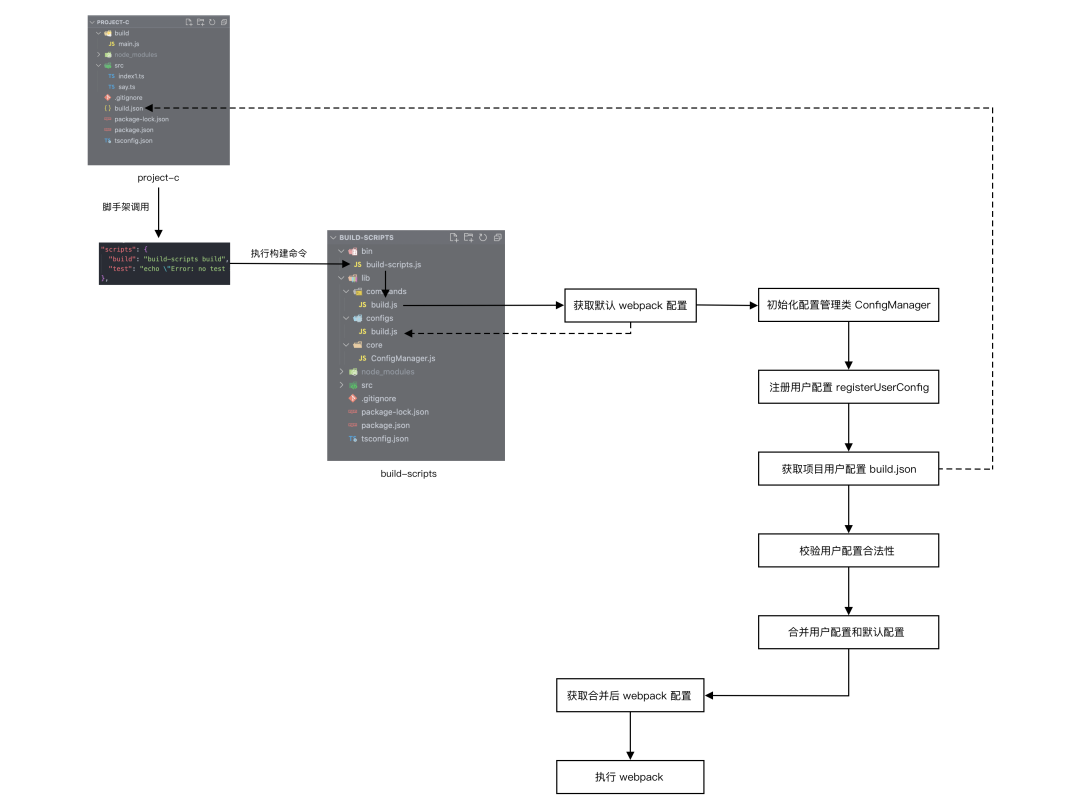
4. 添加插件机制
下面我们的场景再来演进一下:
由于业务需求,项目 project-c 需要处理 xml 文件, 所以项目的构建配置中需要增加 xml 文件的处理 loader,但是 build-scripts 并不支持 config.module.rules 的扩展,此时应该怎么办呢?
我们之前新增的用户配置方案只适用于一些简单的配置覆盖,如果项目涉及到复杂的构建配置自定义操作,就无能为力了。
社区中一般的做法是将构建配置 eject 到项目中,由用户自行修改,比如 react-scripts 。但是 eject 操作是不可逆的,如果后续构建配置有更新,项目就无法直接通过升级 npm 包的方式完成更新,同时单个项目对于构建配置的扩展也无法在多个项目间复用。
理想的方式是设计一种插件机制,能够让用户可插拔式地对构建配置进行扩展,同时这些插件也可以在项目间复用。基于这个目的,我们来对 build-scripts 进行一下改造:
用户配置 build.json 中新增 plugins 字段,用于配置自定义插件列表。
project-c/build.json
{
"entry": "./src/index1",
"outputDir": "./build",
+ "plugins": ["build-plugin-xml"]
}
然后我们再来改造一下 ConfigManager 里的执行逻辑,让 ConfigManager 在执行完用户配置和默认配置的合并后,去依次执行项目 build.json 中定义的插件列表,并将合并后的配置以参数的形式传入插件。
build-scripts/core/ConfigManager.ts
import _ = require('lodash');
import path = require('path');
import assert = require('assert');
...
class ConfigManager {
// webpack 配置
public config: IConfig;
...
/**
* 执行注册用户配置
*
* @param {*} configs
* @memberof ConfigManager
*/
private runUserConfig = async () => {
for (const configInfoKey in this.userConfig) {
+ if (configInfoKey === 'plugins') return;
const configInfo = this.userConfigRegistration[configInfoKey];
...
}
}
+ /**
+ * 执行插件
+ *
+ * @private
+ * @memberof ConfigManager
+ */
+ private runPlugins = async () => {
+ for (const plugin of this.userConfig.plugins) {
+ const pluginPath = require.resolve(plugin, { paths: [process.cwd()] });
+ const pluginFn = require(pluginPath);
+ await pluginFn(this.config);
+ }
+ }
/**
* webpack 配置初始化
*/
public setup = async () => {
// 获取用户配置
this.getUserConfig();
// 用户配置校验及合并
await this.runUserConfig();
+ // 执行插件
+ await this.runPlugins();
}
}
export default ConfigManager;
通过插件执行时传入的构建配置,我们就可以直接在插件内部完成构建配置对于 xml-loader 的扩展。
build-plugin-xml/index.js
module.exports = async (webpackConfig) => {
// 空值属性判断
if (!webpackConfig.module) webpackConfig.module = {};
if (!webpackConfig.module.rules) webpackConfig.module.rules = [];
// 添加 xml-loader
webpackConfig.module.rules.push({
test: /\.xml$/i,
use: require.resolve('xml-loader'),
});
};基于以上的插件机制,项目可以对构建配置实现任意的自定义扩展,同时插件还可以 npm 包的形式在多个项目间复用。
改造完成后,整体的执行流程如下:
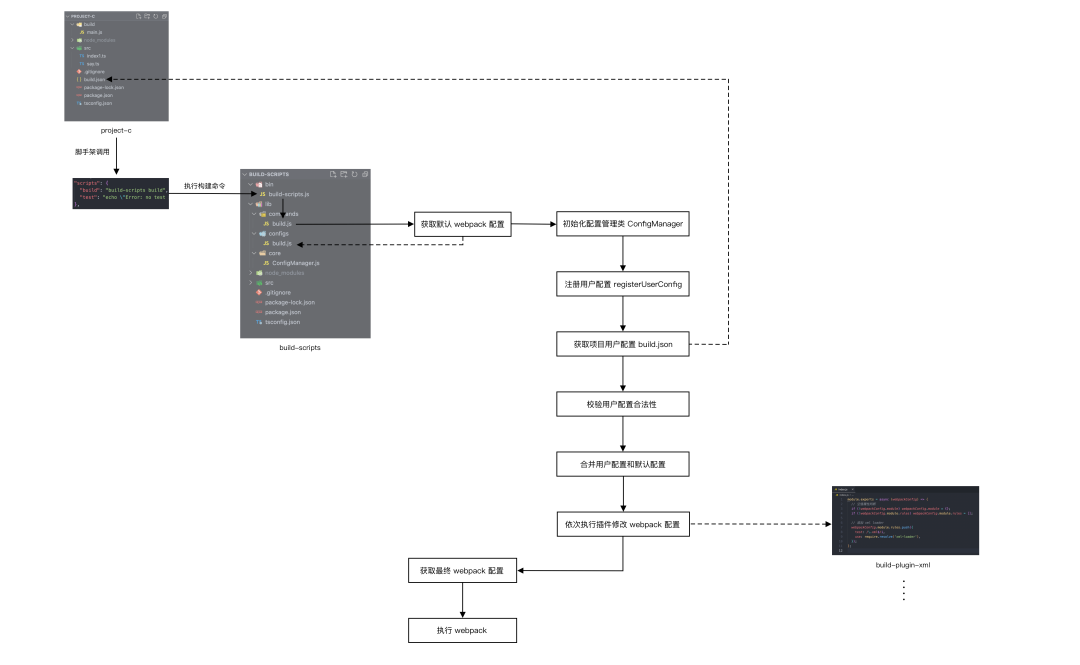
5. 引入 webpack-chain
下面我们的场景再来演进一下:
由于构建性能问题(仅为场景假设),插件 build-plugin-xml 需要将 xml-loader 的匹配规则调整到 ts-loader 的匹配规则之前,所以我们对插件 build-plugin-xml 进行了如下改造:
module.exports = async (webpackConfig) => {
// 空值属性判断
if (!webpackConfig.module) webpackConfig.module = {};
if (!webpackConfig.module.rules) webpackConfig.module.rules = [];
// 定义 xml-loader 规则
const xmlRule = {
test: /\.xml$/i,
use: require.resolve('xml-loader'),
};
// 找到 ts-loader 规则位置
const tsIndex = webpackConfig.module.rules.findIndex(
(rule) => String(rule.test) === '/\\.ts?$/'
);
// 添加 xml-loader 规则
if (tsIndex > -1) {
webpackConfig.module.rules.splice(tsIndex - 1, 0, xmlRule);
} else {
webpackConfig.module.rules.push(xmlRule);
}
};
改造完成后,插件 build-plugin-xml 针对 xml-loader 的扩展一共做了四件事:
- 对 webapck 进行空值属性判断和补齐。
- 定义 xml-loader 规则。
- 找到 ts-loader 规则的位置。
- 将 xml-loader 规则插入到 ts-loader 规则前。
观察上面的改造我们可以发现,虽然我们的构建配置并不复杂,但针对于它的修改和扩展还是比较繁琐的。这主要是由于 webpack 构建配置是以一个 JavaScript 对象的形式来进行维护的,一般项目中的配置对象往往很大,且内部属性间存在层层嵌套,针对配置对象的修改和扩展会涉及到各种判空、遍历、分支处理等操作,所以逻辑会显得比较复杂。
为了解决插件中构建配置修改和扩展逻辑复杂的问题,我们可以在项目中来引入 webpack-chain :
webpack-chain 是一种 webpack 的流式配置方案,通过链式调用的方式来操作配置对象。其核心是 ChainedMap 和 ChainedSet 两个对象类型,借助 ChainedMap 和 ChainedSet 提供的操作方法,我们能够很方便地对配置对象进行修改和扩展,可以避免之前手动操作 JavaScript 对象时带来的繁琐。这里不做过多介绍,感兴趣的同学可以查看官方文档[1]。
我们先来将默认的构建配置修改为 webpack-chain 的方式。
build-scripts/src/configs/build.ts
+ import * as Config from 'webpack-chain';
const path = require('path');
const rootDir = process.cwd();
- const buildConfig = {
- entry: path.resolve(rootDir, './src/index'),
- module: {
- rules: [
- {
- test: /\.ts?$/,
- use: require.resolve('ts-loader'),
- exclude: /node_modules/,
- },
- ],
- },
- resolve: {
- extensions: ['.ts', '.js'],
- },
- output: {
- filename: 'main.js',
- path: path.resolve(rootDir, './dist'),
- },
- };
+ const buildConfig = new Config();
+
+ buildConfig.entry('index').add('./src/index');
+
+ buildConfig.module
+ .rule('ts')
+ .test(/\.ts?$/)
+ .use('ts-loader')
+ .loader(require.resolve('ts-loader'));
+
+ buildConfig.resolve.extensions.add('.ts').add('.js');
+
+ buildConfig.output.filename('main.js');
+ buildConfig.output.path(path.resolve(rootDir, './dist'));
export default buildConfig;然后我们将 ConfigManager 中涉及到构建配置的地方也切换为 webpack-chain 的方式。
src/core/ConfigManager.ts
import _ = require('lodash');
import path = require('path');
import assert = require('assert');
+ import WebpackChain = require('webpack-chain');
...
interface IUserConfigArgs {
name: string;
defaultValue?: any;
validation?: (value: any) => Promise<boolean>;
- configWebpack?: (defaultConfig: IConfig, value: any) => void;
+ configWebpack?: (defaultConfig: WebpackChain, value: any) => void;
}
class ConfigManager {
// webpack 配置
- public config: IConfig;
+ public config: WebpackChain;
// 用户配置
public userConfig: IConfig;
// 用户配置注册信息
private userConfigRegistration: IUserConfigRegistration;
- constructor(config: IConfig) {
+ constructor(config: WebpackChain) {
this.config = config;
this.userConfig = {};
this.userConfigRegistration = {};
}
...
}
export default ConfigManager;
同时用户配置中涉及到构建配置的地方也切换为 webpack-chain 的方式。
src/commands/build.ts
...
export = async () => {
...
// 注册用户配置
manager.registerUserConfig([
{
...
// 配置值合并
configWebpack: async (defaultConfig, value) => {
- defaultConfig.entry = path.resolve(rootDir, value);
+ defaultConfig.entry('index').clear().add(path.resolve(rootDir, value));
},
},
{
...
// 配置值合并
configWebpack: async (defaultConfig, value) => {
- defaultConfig.output.path = path.resolve(rootDir, value);
+ defaultConfig.output.path(path.resolve(rootDir, value));
},
},
]);
// webpack 配置初始化
await manager.setup();
// 实例化 webpack
- const compiler = webpack(manager.config);
+ const compiler = webpack(manager.config.toConfig());
...
};
借助 webpack-chain ,插件 build-plugin-xml 针对 xml-loader 的扩展逻辑可以简化为:
module.exports = async (webpackConfig) => {
- // 空值属性判断
- if (!webpackConfig.module) webpackConfig.module = {};
- if (!webpackConfig.module.rules) webpackConfig.module.rules = [];
-
- // 定义 xml 规则
- const xmlRule = {
- test: /\.xml$/i,
- use: require.resolve('xml-loader'),
- };
-
- // 找到 ts 规则位置
- const tsIndex = webpackConfig.module.rules.findIndex(
- (rule) => String(rule.test) === '/\\.ts?$/'
- );
-
- // 添加 xml 规则
- if (tsIndex > -1) {
- webpackConfig.module.rules.splice(tsIndex - 1, 0, xmlRule);
- } else {
- webpackConfig.module.rules.push(xmlRule);
- }
+ webpackConfig.module
+ .rule('xml')
+ .before('ts')
+ .test(/\.xml$/i)
+ .use('xml-loader')
+ .loader(require.resolve('xml-loader'));
};
相对之前复杂的空值判断和对象遍历逻辑,webpack-chain 极大地简化了插件内部对于配置对象的修改和扩展操作,无论是代码质量,还是开发体验,相对于之前来说都有不小的提升。
6. 插件化默认构建配置
下面我们的场景再来演进一下:
假设现在接入 build-scripts 的项目都是 react 项目, 由于业务方向的调整,后续团队的技术栈会切换到 rax,新增的 rax 项目想继续使用 build-scripts 进行项目间构建配置的复用,此时应该怎么办呢?
由于 build-scripts 里默认的构建配置是基于 react 的,所以 rax 项目是没办法直接基于插件进行扩展的,难道需要基于 rax 构建配置再新建一个 build-scritps 项目吗?这样显然是没办法做到核心逻辑复用的。我们来换个思路想想,既然插件可以修改构建配置,那么能不能将构建配置的初始化也放在插件里?这样就能够实现构建配置和 build-scripts 的解耦,任意类型的项目都能够基于 build-scripts 来进行构建配置的管理和扩展。
基于这个目的,我们下面来对 build-scripts 进行一下改造:
我们首先对 ConfigManager 里的逻辑进行一下调整,新增 setConfig 方法提供给插件进行构建配置的初始化,由于插件还承担修改和扩展构建配置的职责,而这部分逻辑的调用是在初始配置和用户配置合并后的,所以我们通过 onGetWebpackConfig 方法注册回调函数的方式来执行这部分逻辑。
src/core/ConfigManager.ts
import _ = require('lodash');
import path = require('path');
import assert = require('assert');
import WebpackChain = require('webpack-chain');
...
+ // webpack 配置修改函数类型定义
+ type IModifyConfigFn = (defaultConfig: WebpackChain) => void;
class ConfigManager {
// webpack 配置
public config: WebpackChain;
// 用户配置
public userConfig: IConfig;
// 用户配置注册信息
private userConfigRegistration: IUserConfigRegistration;
+ // 已注册的 webpack 配置修改函数
+ private modifyConfigFns: IModifyConfigFn[];
- constructor(config: WebpackChain) {
- this.config = config;
+ constructor() {
this.userConfig = {};
this.userConfigRegistration = {};
+ this.modifyConfigFns = [];
}
+ /**
+ * 设置 webpack 配置
+ *
+ * @param {WebpackChain} config
+ * @memberof ConfigManager
+ */
+ public setConfig = (config: WebpackChain) => {
+ this.config = config;
+ };
+ /**
+ * 注册 webpack 配置修改函数
+ *
+ * @param {(defaultConfig: WebpackChain) => void} fn
+ * @memberof ConfigManager
+ */
+ public onGetWebpackConfig = (fn: (defaultConfig: WebpackChain) => void) => {
+ this.modifyConfigFns.push(fn);
+ };
/**
* 注册用户配置
*
* @param {IUserConfigArgs[]} configs
* @memberof ConfigManager
*/
public registerUserConfig = (configs: IUserConfigArgs[]) => {
...
};
/**
* 获取用户配置
*
* @private
* @return {*}
* @memberof ConfigManager
*/
private getUserConfig = () => {
...
};
/**
* 执行注册用户配置
*
* @param {*} configs
* @memberof ConfigManager
*/
private runUserConfig = async () => {
...
};
/**
* 执行插件
*
* @private
* @memberof ConfigManager
*/
private runPlugins = async () => {
for (const plugin of this.userConfig.plugins) {
const pluginPath = require.resolve(plugin, { paths: [process.cwd()] });
const pluginFn = require(pluginPath);
- await pluginFn(this.config);
+ await pluginFn({
+ setConfig: this.setConfig,
+ registerUserConfig: this.registerUserConfig,
+ onGetWebpackConfig: this.onGetWebpackConfig,
+ });
}
};
+ /**
+ * 执行 webpack 配置修改函数
+ *
+ * @private
+ * @memberof ConfigManager
+ */
+ private runWebpackModifyFns = async () => {
+ this.modifyConfigFns.forEach((fn) => fn(this.config));
+ };
/**
* webpack 配置初始化
*/
public setup = async () => {
// 获取用户配置
this.getUserConfig();
+ // 执行插件
+ await this.runPlugins();
// 用户配置校验及合并
await this.runUserConfig();
- // 执行插件
- await this.runPlugins();
+ // 执行 webpack 配置修改函数
+ await this.runWebpackModifyFns();
};
}
export default ConfigManager;
然后我们将 build-scripts 里默认配置相关的逻辑给抽离出来。
npm 包 build-scripts
build-scripts
|- /bin
|- build-scripts.js
|- /lib (ts 构建目录,文件同 src)
|- /src
|- /commands
|- build.ts
- |- /configs
- |- build.ts
|- /core
|- ConfigManager.ts
|- tsconfig.json
|- package.json
|- package-lock.json由于用户配置一般是跟默认构建配置走的,所以我们也抽离出来。
src/commands/build.ts
- import * as path from 'path';
import * as webpack from 'webpack';
- import defaultConfig from '../configs/build';
import ConfigManager from '../core/ConfigManager';
export = async () => {
- const rootDir = process.cwd();
// 初始化配置管理类
- const manager = new ConfigManager(defaultConfig);
+ const manager = new ConfigManager();
- // 注册用户配置
- manager.registerUserConfig([
- {
- // entry 配置
- name: 'entry',
- // 配置值校验
- validation: async (value) => {
- return typeof value === 'string';
- },
- // 配置值合并
- configWebpack: async (defaultConfig, value) => {
- defaultConfig.entry('index').clear().add(path.resolve(rootDir, value));
- },
- },
- {
- // outputDir 配置
- name: 'outputDir',
- // 配置值校验
- validation: async (value) => {
- return typeof value === 'string';
- },
- // 配置值合并
- configWebpack: async (defaultConfig, value) => {
- defaultConfig.output.path(path.resolve(rootDir, value));
- },
- },
- ]);
// webpack 配置初始化
await manager.setup();
// 实例化 webpack
const compiler = webpack(manager.config.toConfig());
// 执行 webpack 编译
compiler.run((err, stats) => {
compiler.close((closeErr) => {});
});
};
我们将抽离的默认构建配置的相关逻辑,封装到插件 build-plugin-base 里。
build-plugin-base/index.js
const Config = require('webpack-chain');
const path = require('path');
const rootDir = process.cwd();
module.exports = async ({ setConfig, registerUserConfig }) => {
/**
* 设置默认配置
*/
const buildConfig = new Config();
buildConfig.entry('index').add('./src/index');
buildConfig.module
.rule('ts')
.test(/\.ts?$/)
.use('ts-loader')
.loader(require.resolve('ts-loader'));
buildConfig.resolve.extensions.add('.ts').add('.js');
buildConfig.output.filename('main.js');
buildConfig.output.path(path.resolve(rootDir, './dist'));
setConfig(buildConfig);
/**
* 注册用户配置
*/
registerUserConfig([
{
// entry 配置
name: 'entry',
// 配置值校验
validation: async (value) => {
return typeof value === 'string';
},
// 配置值合并
configWebpack: async (defaultConfig, value) => {
defaultConfig.entry('index').clear().add(path.resolve(rootDir, value));
},
},
{
// outputDir 配置
name: 'outputDir',
// 配置值校验
validation: async (value) => {
return typeof value === 'string';
},
// 配置值合并
configWebpack: async (defaultConfig, value) => {
defaultConfig.output.path(path.resolve(rootDir, value));
},
},
]);
};同时我们还需要调整一下 build-plugin-xml 里的逻辑,将构建配置扩展的逻辑通过 onGetWebpackConfig 方法改为回调函数的方式调用。
build-plugin-xml/index.js
- module.exports = async (webpackConfig) => {
+ module.exports = async ({ onGetWebpackConfig }) => {
+ onGetWebpackConfig((webpackConfig) => {
webpackConfig.module
.rule('xml')
.test(/\.xml$/i)
.use('xml-loader')
.loader(require.resolve('xml-loader'));
+ });
};通过以上的改造,我们实现了默认构建配置和 build-scripts 的解耦,理论上任意类型的项目均可基于 build-scripts 来实现构建配置的项目间复用及扩展。
改造完成后,整体的执行流程如下:
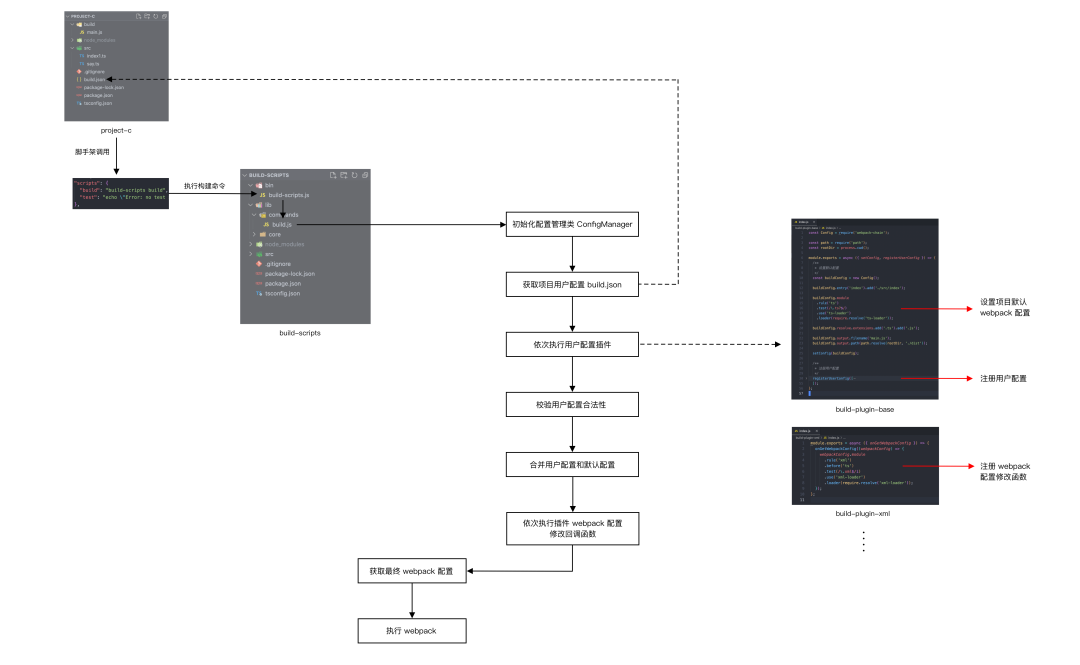
7. 添加多任务机制
最后我们的场景再来扩展一下:
假设单个项目的构建产物不止一种,例如 Rax 项目需要打包构建为 H5 和 小程序两种类型,两种类型对应的是不同的构建配置,但 build-scripts 只支持一份构建配置, 此时应该怎么办呢?
webpack 其实默认是支持多构建配置执行的,我们只需要向 webpack 的 compiler 实例传入一个数组就行:
const webpack = require('webpack');
webpack([
{ entry: './index1.js', output: { filename: 'bundle1.js' } },
{ entry: './index2.js', output: { filename: 'bundle2.js' } }
], (err, stats) => {
process.stdout.write(stats.toString() + '\n');
})基于 webpack 的多配置执行能力,我们可以来考虑为 build-scripts 设计一种多任务机制。 基于这个目的,我们下面来对 build-scripts 进行一下改造:
首先我们来调整一下 ConfigManager 里的逻辑,将 webapck 的默认配置改为数组形式,同时新增 registerTask 方法来进行 webpack 默认配置的注册,同时调整一下 webpack 默认配置引用的相关逻辑。
build-scripts/src/commands/ConfigManager.ts
import _ = require('lodash');
import path = require('path');
import assert = require('assert');
import WebpackChain = require('webpack-chain');
...
// webpack 配置修改函数类型定义
type IModifyConfigFn = (defaultConfig: WebpackChain) => void;
+ // webpack 任务配置类型定义
+ export interface ITaskConfig {
+ name: string;
+ chainConfig: WebpackChain;
+ modifyFunctions: IModifyConfigFn[];
+ }
class ConfigManager {
- // webpack 配置
- public config: WebpackChain;
+ // webpack 配置列表
+ public configArr: ITaskConfig[];
// 用户配置
public userConfig: IConfig;
// 用户配置注册信息
private userConfigRegistration: IUserConfigRegistration;
- // 已注册的 webpack 配置修改函数
- private modifyConfigFns: IModifyConfigFn[];
constructor() {
+ this.configArr = [];
this.userConfig = {};
this.userConfigRegistration = {};
- this.modifyConfigFns = [];
}
- /**
- * 设置 webpack 配置
- *
- * @param {WebpackChain} config
- * @memberof ConfigManager
- */
- public setConfig = (config: WebpackChain) => {
- this.config = config;
- };
+ /**
+ * 注册 webpack 任务
+ *
+ * @param {string} name
+ * @param {WebpackChain} chainConfig
+ * @memberof ConfigManager
+ */
+ public registerTask = (name: string, chainConfig: WebpackChain) => {
+ const exist = this.configArr.find((v): boolean => v.name === name);
+ if (!exist) {
+ this.configArr.push({
+ name,
+ chainConfig,
+ modifyFunctions: [],
+ });
+ } else {
+ throw new Error(`[Error] config '${name}' already exists!`);
+ }
+ };
/**
* 注册 webpack 配置修改函数
*
+ * @param {string} name
* @param {(defaultConfig: WebpackChain) => void} fn
* @memberof ConfigManager
*/
- public onGetWebpackConfig = (fn: (defaultConfig: WebpackChain) => void) => {
- this.modifyConfigFns.push(fn);
- };
+ public onGetWebpackConfig = (
+ name: string,
+ fn: (defaultConfig: WebpackChain) => void
+ ) => {
+ const config = this.configArr.find((v): boolean => v.name === name);
+
+ if (config) {
+ config.modifyFunctions.push(fn);
+ } else {
+ throw new Error(`[Error] config '${name}' does not exist!`);
+ }
+ };
/**
* 注册用户配置
*
* @param {IUserConfigArgs[]} configs
* @memberof ConfigManager
*/
public registerUserConfig = (configs: IUserConfigArgs[]) => {
...
};
/**
* 获取用户配置
*
* @private
* @return {*}
* @memberof ConfigManager
*/
private getUserConfig = () => {
...
};
/**
* 执行注册用户配置
*
* @param {*} configs
* @memberof ConfigManager
*/
private runUserConfig = async () => {
for (const configInfoKey in this.userConfig) {
...
// 配置值更新到默认 webpack 配置
if (configInfo.configWebpack) {
- await configInfo.configWebpack(this.config, configValue);
+ // 遍历已注册的 webapck 任务
+ for (const webpackConfigInfo of this.configArr) {
+ await configInfo.configWebpack(
+ webpackConfigInfo.chainConfig,
+ configValue
+ );
+ }
}
}
};
/**
* 执行插件
*
* @private
* @memberof ConfigManager
*/
private runPlugins = async () => {
for (const plugin of this.userConfig.plugins) {
const pluginPath = require.resolve(plugin, { paths: [process.cwd()] });
const pluginFn = require(pluginPath);
await pluginFn({
- setConfig: this.setConfig,
+ registerTask: this.registerTask,
registerUserConfig: this.registerUserConfig,
onGetWebpackConfig: this.onGetWebpackConfig,
});
}
};
/**
* 执行 webpack 配置修改函数
*
* @private
* @memberof ConfigManager
*/
private runWebpackModifyFns = async () => {
- this.modifyConfigFns.forEach((fn) => fn(this.config));
+ for (const webpackConfigInfo of this.configArr) {
+ webpackConfigInfo.modifyFunctions.forEach((fn) =>
+ fn(webpackConfigInfo.chainConfig)
+ );
+ }
};
/**
* webpack 配置初始化
*/
public setup = async () => {
// 获取用户配置
this.getUserConfig();
// 执行插件
await this.runPlugins();
// 用户配置校验及合并
await this.runUserConfig();
// 执行 webpack 配置修改函数
await this.runWebpackModifyFns();
};
}
export default ConfigManager;
build 命令执行时的构建配置获取也需要改为数组的形式。
build-scripts/src/commands/build.ts
import * as webpack from 'webpack';
import ConfigManager from '../core/ConfigManager';
export = async () => {
// 初始化配置管理类
const manager = new ConfigManager();
// webpack 配置初始化
await manager.setup();
// 实例化 webpack
- const compiler = webpack(manager.config.toConfig());
+ const compiler = webpack(
+ manager.configArr.map((config) => config.chainConfig.toConfig())
+ );
// 执行 webpack 编译
compiler.run((err, stats) => {
compiler.close((closeErr) => {});
});
};
插件 build-plugin-base 也需要调整默认构建配置的注册方式。
build-plugin-base/index.js
const Config = require('webpack-chain');
const path = require('path');
const rootDir = process.cwd();
- module.exports = async ({ setConfig, registerUserConfig }) => {
+ module.exports = async ({ registerTask, registerUserConfig }) => {
/**
* 设置默认配置
*/
const buildConfig = new Config();
...
- setConfig(buildConfig)
+ registerTask('base', buildConfig);
/**
* 注册用户配置
*/
registerUserConfig([
...
]);
};
插件 build-plugin-xml 也需要添加上对应的 webpack 任务名称参数。
build-plugin-xml/index.js
module.exports = async ({ onGetWebpackConfig }) => {
- onGetWebpackConfig((webpackConfig) => {
+ onGetWebpackConfig('base', (webpackConfig) => {
webpackConfig.module
.rule('xml')
.before('ts')
.test(/\.xml$/i)
.use('xml-loader')
.loader(require.resolve('xml-loader'));
});
};通过以上的改造,我们为 build-scripts 增加了多任务执行的机制,可以实现单个项目下的多构建任务执行。
改造完成后,整体的执行流程如下:
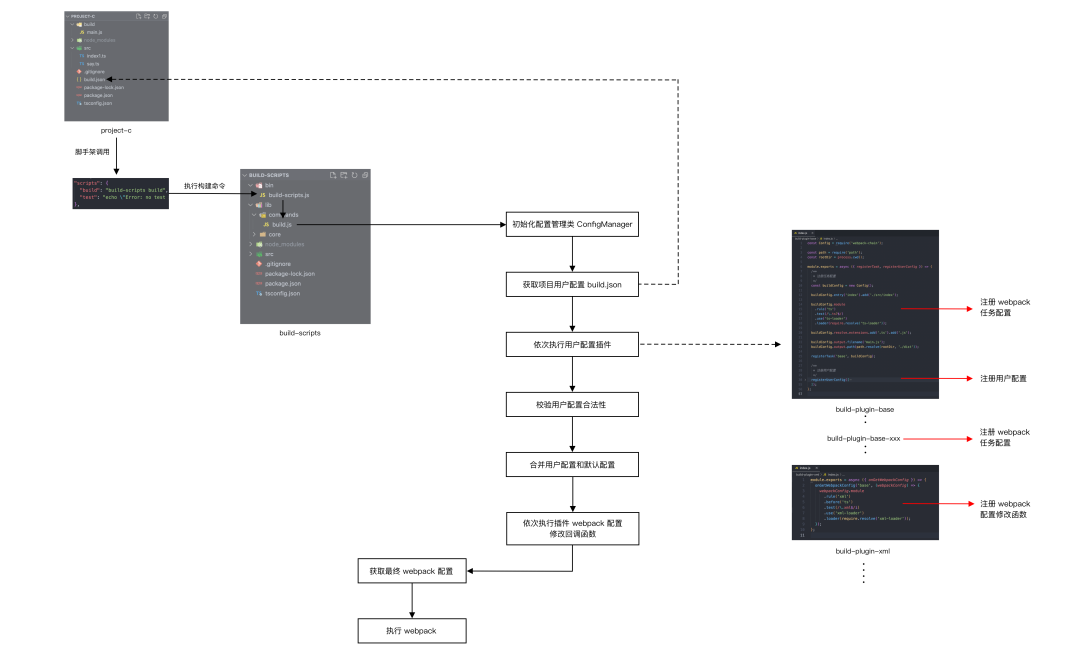
三、写在最后
以上我们通过场景演进的方式,对 build-scripts 核心的设计原理和相关方法进行了讲解。通过以上的分析,我们可以看出 build-scripts 本质上是一个具有灵活插件机制的配置管理方案,不仅仅局限于 webpack 配置,任何有跨项目间配置复用及扩展的场景,都可以借助 build-scripts 的设计思路。
注:文中涉及示例代码可通过仓库 _ build-scripts-demo_[2] 查看,同时 build-scripts 中未介绍到的相关方法,感兴趣的同学也可以通过仓库 _build-scripts_[3] 阅读相关源码。
参考资料
[1] 官方文档: https://github.com/neutrinojs/webpack-chain
[2] _ build-scripts-demo_: https://github.com/CavsZhouyou/build-scripts-demo
[3] build-scripts: https://github.com/ice-lab/build-scripts